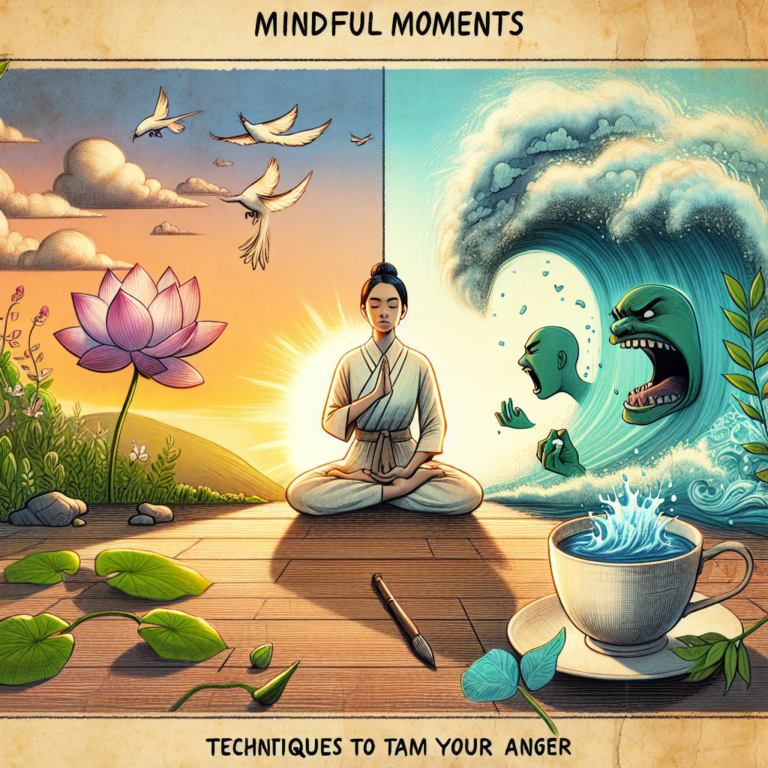
Mindfulness Techniques: Your Roadmap to Anger Management – The Ultimate Guide
Anger can be a tempestuous emotion, often leading to actions that we regret. It’s a natural response to perceived threats, injustices, or frustrations, but when it becomes overwhelming, it can affect our physical health, relationships, and overall well-being. The great news? There are effective methods to manage anger, one of the most powerful being mindfulness. In this article, we will explore "Mindfulness Techniques: Your Roadmap to Anger Management", providing you with insights, strategies, and real-world applications to help navigate your emotional responses with grace and control.
Understanding Anger
Anger can manifest in various forms—frustration, rage, indignation, and irritation—essentially anything that feels like it disrupts your inner peace. While it’s often seen as negative, it can also be a compelling motivator for change when handled correctly. Understanding your anger is the first step toward managing it.
What is Mindfulness?
Mindfulness is the practice of being fully present and engaged in the current moment while acknowledging your feelings and thoughts without judgment. This technique promotes emotional awareness, helping individuals understand what triggers their anger and how to respond more constructively.
Mindfulness Techniques: Your Roadmap to Anger Management, therefore, involves recognizing your emotional state and implementing strategies to process anger healthily.
The Science Behind Mindfulness and Anger Management
Studies have shown that mindfulness can lead to reductions in anger and increases in emotional regulation. When you practice mindfulness, you can observe your emotions, understand them, and choose your reactions more judiciously.
Table 1: Research Findings on Mindfulness and Anger
| Study Source | Key Finding |
|---|---|
| Journal of Clinical Psychology | Mindfulness meditation reduced anger and aggression by 25%. |
| Mindfulness Journal | Participants showed improved emotional regulation after a mindfulness program. |
| International Journal of Stress Management | Mindfulness training led to a significant decrease in anger scores. |
Mindfulness Techniques: Your Roadmap to Anger Management
Here, we will discuss a series of actionable mindfulness techniques that can serve as your roadmap to managing anger effectively.
1. Mindful Breathing
One of the simplest yet most powerful mindfulness techniques is mindful breathing. When anger strikes, take a moment to focus on your breath.
How to Practice:
- Take a deep breath in through your nose, allowing your abdomen to expand.
- Hold for a count of four.
- Exhale slowly through your mouth.
- Repeat this process for at least three cycles.
Case Study:
A study from the University of Massachusetts emphasized the impact of mindful breathing. Participants who employed this technique reported a significant reduction in episodes of rage during conflict situations.
2. Body Scan Meditation
This technique involves focusing your attention systematically on different parts of your body. It’s particularly effective for releasing tension associated with anger.
How to Practice:
- Lie down comfortably and close your eyes.
- Start from the top of your head and progressively focus on each body part down to your toes, noting any tension without judgment.
- Take deep breaths to encourage relaxation in tense areas.
Case Study:
In a group course on stress management, participants who practiced body scan meditation found that their awareness of physical sensations associated with anger improved, leading to better emotional regulation.
3. Mindful Walking
Movement can enhance mindfulness. Mindful walking combines physical activity with awareness and allows you to process your emotions.
How to Practice:
- Go outside and walk slowly.
- Notice the sensation of your feet touching the ground, the rhythm of your breath, and the environment around you.
- If you feel anger arise, express it through your movement; let every step diminish the intensity.
Case Study:
In a controlled study, participants who engaged in mindful walking reported a decrease in anger-related thoughts and feelings, indicating that physical movement complemented mindfulness practices effectively.
4. Journaling Your Feelings
Writing can help clarify emotions. By journaling your feelings, you can identify patterns and triggers associated with your anger.
How to Practice:
- Set aside time each day to write about events that triggered anger.
- Reflect on why those situations provoked a strong response and what you could do differently next time.
Case Study:
The Journal of Health Psychology published findings showing that participant journals led to improved emotional expression and regulation over time.
5. The "Five Senses" Exercise
Utilize your senses to ground yourself in the present moment during instances of anger.
How to Practice:
- Identify five things you can see, four things you can feel, three things you can hear, two things you can smell, and one thing you can taste.
Case Study:
Research highlighted in the Journal of Mindfulness revealed that participants employing sensory grounding techniques reported a drop in anger levels and improved stress management.
Developing Your Mindfulness Routine
Incorporating these mindfulness techniques requires consistency. Establishing a routine can lead to better results and heightened emotional intelligence over time.
- Start Small: Dedicate a few minutes each day to practice mindfulness techniques.
- Join a Group: Participating in mindfulness workshops or classes can motivate you and provide support.
- Track Your Progress: Maintain a journal or use apps to monitor improvements in managing anger.
Troubleshooting Common Challenges
Even with a solid roadmap in hand, executing these techniques can sometimes be tricky. Here are common hurdles and solutions:
| Challenge | Solution |
|---|---|
| Difficulty in focusing | Start with shorter sessions, 2-5 minutes. |
| Intense emotions surfacing | It’s okay! Acknowledge them and let them pass. |
| Feeling skeptical about effectiveness | Keep an open mind, and try techniques over time. |
Conclusion: Your Path Forward
Mindfulness Techniques: Your Roadmap to Anger Management can transform your emotional landscape. Each method provides an opportunity to redirect anger into constructive action. By integrating these strategies into your daily life, you can achieve more balanced interactions, less stress, and an enhanced sense of well-being. Always remember that anger is a natural emotion, not something to stigmatize. With the right tools, you can navigate its complexities with confidence and clarity.
FAQs Section
1. What is mindfulness in the context of anger management?
Mindfulness involves being present with your emotions without judgment. It helps individuals recognize and manage anger more effectively.
2. How often should I practice mindfulness techniques?
Aim to practice techniques daily, even if just for a few minutes. Consistency is key.
3. Can mindfulness completely eliminate anger?
While mindfulness can significantly reduce anger and improve emotional regulation, experiencing anger is a natural part of being human.
4. Are there any resources recommended for learning mindfulness?
Many books, apps, and courses are available online, including "The Miracle of Mindfulness" by Thich Nhat Hanh and apps like Headspace and Calm.
5. What should I do if I feel overwhelmed by anger?
If anger feels uncontrollable, seeking professional help from a psychologist or counselor is advisable who can guide you through your emotions safely.
Mindfulness Techniques: Your Roadmap to Anger Management offers a profound set of tools for anyone looking to cultivate emotional clarity and control. Embrace the journey toward a more peaceful existence; every step you take is a step closer to harmony in your emotional life.















